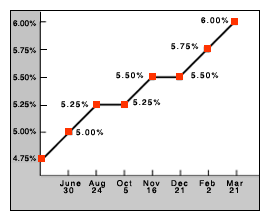|
Fed not targeting stocks
|
 |
April 5, 2000: 4:29 p.m. ET
Addressing equity prices with rates would have little effect: Greenspan
By Staff Writer M. Corey Goldman
|
NEW YORK (CNNfn) - Surging equity prices are threatening the record U.S. economic expansion by creating a feeling of wealth among Americans that prompts them to spend, but it's not up to the Federal Reserve to focus its interest-rate policy at the stock market, Fed Chairman Alan Greenspan said.
Speaking at a White House summit on the "new economy," the Fed Chief reiterated his concern about the pace of the economy and the so-called wealth effect, whereby surging equity prices have bolstered Americans' confidence about their economic situations and spurred them to spend.
Greenspan opted to keep his remarks focused on the progress of the economy and the risks of accelerating inflation -- not on the recent gut-wrenching ups and downs of the stock market, which have kept millions of eyes trained on computer screens and dominated headlines in recent days.
"Even if we were to foster somewhat larger movements in short-term rates to address changes in stock prices, I doubt that investors' perceptions of equity risks would be much affected and thus that equity prices would be meaningfully influenced," he said. "In short, monetary policy should focus on the broader economy and on pending inflationary and deflationary pressures."
White-knuckle gyrations
His remarks came after days of white-knuckle gyrations in U.S. stock markets. While few analysts had expected the recent volatility would dissuade the Fed from raising rates again at its May 16 policy meeting, some had speculated that the Fed might think twice about tapping on the brakes.
 However, in uncharacteristically clear fashion, Greenspan indicated that adjusting short-term rates -- the only effective tool the Fed has to control the pace of the economy -- would likely do little to convince investors to keep their money out of the high-flying stock market and in the bank. However, in uncharacteristically clear fashion, Greenspan indicated that adjusting short-term rates -- the only effective tool the Fed has to control the pace of the economy -- would likely do little to convince investors to keep their money out of the high-flying stock market and in the bank.
"The tone of Greenspan's comments suggest he's still on a tightening track, despite a wobbly equity market," said Rob Palombi, a senior economist with Standard & Poor's MMS. "Indeed, Greenspan indicated the markets are expecting a 'gradual' policy course," meaning the Fed won't be surprising anyone with a "between-meeting" rate increase, or a half-percent rate increase.
What has been plaguing Greenspan and most of his colleagues at the Fed for the better part of a year is the torrid pace of the U.S. economy and the possibility of accelerating inflation -- something that was feared would bring the record expansion of the U.S. economy to an abrupt halt.
"History will judge..."
To avoid that, the Fed has been slowly raising the fed funds rate -- the target interest rate that commercial banks are required to stick to when lending to each other overnight. The rate dictates how much consumers and businesses pay in interest for their lines of credit, credit cards and other loans.
At the same time, the rate increases have had little effect on the U.S. stock market, particularly the high-flying Nasdaq, which posted annual returns of 86 percent in 1999. While Greenspan said the Fed doesn't target equity prices, he issued an oblique warning about the recent run-up in the price of the shares of those tech companies that mostly trade on the Nasdaq.
 "History will judge" whether expectations among investors for higher profits among tech companies was "prescience" or "wishful thinking," he said. "History will judge" whether expectations among investors for higher profits among tech companies was "prescience" or "wishful thinking," he said.
Greenspan addressed concerns about the lack of available workers needed to take on positions in the surging U.S. job market, robust demand for U.S. goods from overseas that has pushed the U.S. trade deficit to record highs and "pervasive evidence" that the wealth effect is "contributing to the risk of imbalances in our economy," he said.
He also noted the now-declining price of crude oil. Some analysts have begun to speculate that rising short-term rates combined with the falling price of oil could create deflation, where prices for goods and services decline, rather than rise. "Despite the very recent declines in the price of oil, there are risks here that need to be monitored closely," Greenspan said.
Marshall Acuff, a senior equity strategist with Solomon Smith Barney, told CNNfn's Talking Stocks that he was pleased that Greenspan chose to keep his remarks trained on the progress of the economy and not on the progress of the country's predominant equity markets. (401KB WAV) (401KB AIFF)
A who's who of speakers
Greenspan joined a veritable who's who of guest speakers, including Abby Joseph Cohen, one of the most influential strategists on Wall Street, who chairs Goldman Sachs Group's investment policy committee, and Microsoft Corp. (MSFT: Research, Estimates) founder Bill Gates, who attended despite the Justice Department's antitrust ruling against his company.
Cohen told CNNfn's In the Money earlier Wednesday that her firm is not overly concerned about the recent market volatility, particularly among high-tech companies, and still expects the S&P 500 index to reach 1,625 by the end of this year. The index currently rests just under the 1,500-mark.
At the same time, she said that the economy is still in "excellent shape," and that strong first-quarter earnings will likely trigger another good year in the markets, though perhaps not as dramatically as investors have seen in the recent past. (376K WAV) (376K AIFF).
Other notable attendees included U.S. Treasury Secretary Lawrence Summers, former U.S. Deputy Treasury Secretary Robert Altman, Commerce Secretary William Daley, National Economic Council Director Gene Sperling and Martin Baily, Chair of the Council of Economic Advisors. 
|
|
|
|
|
 |

|

